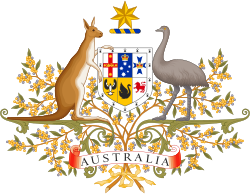Members of the Yorta Yorta Aboriginal Community v Victoria facts for kids
Quick facts for kids Member the Yorta Yorta Aboriginal Community v Victoria |
|
|---|---|
 |
|
| Court | High Court of Australia |
| Decided | 12 December 2002 |
| Transcript(s) | 14 Dec Special Leave 23 May 24 May |
| Case history | |
| Prior action(s) | |
| Case opinions | |
| (5:2) the finding that claimants had ceased to occupy lands in accordance with traditional laws and customs meant that their claim failed per Gleeson CJ, McHugh, Gummow, Hayne & Callinan JJ. Gaudron & Kirby JJ dissenting |
|
| Court membership | |
| Judge(s) sitting | Gleeson CJ, Gaudron, McHugh, Gummow, Kirby, Hayne and Callinan JJ |
The case of Yorta Yorta v Victoria was a very important legal battle in Australia. It was about native title, which is the special right Indigenous Australians have to their traditional lands and waters. The Yorta Yorta people, an Aboriginal Australian group from northern Victoria, brought this claim.
They wanted their traditional rights to their land to be legally recognized. However, their claim was first turned down by a judge in the Federal Court of Australia in 1998. Later appeals to higher courts were also unsuccessful.
Contents
The First Decision
In 1998, Justice Olney made the first decision about the Yorta Yorta claim. He ruled that the "tide of history" had "washed away" the Yorta Yorta people's connection to their traditional laws and customs. This meant he believed they no longer followed their old traditions enough to claim native title.
This decision was very upsetting for the Yorta Yorta community. It suggested that their culture had changed too much over time.
Appealing the Decision
The Yorta Yorta people did not agree with the first decision. They decided to appeal it to a higher court. They argued that the judge had looked at their traditions as if they were "frozen in time." They believed that traditional laws and customs can change and adapt over time.
They said that their culture should be allowed to evolve. Despite their arguments, the appeal was mostly dismissed by the Federal Court. Two out of three judges agreed with the original decision.
The High Court's Ruling
The Yorta Yorta people then took their case to the High Court of Australia. This is the highest court in Australia. They hoped the High Court would see things differently.
However, in December 2002, the High Court also dismissed their appeal. Five out of seven judges agreed with the earlier decisions. This was a difficult outcome for the Yorta Yorta community.
A New Agreement for the Yorta Yorta People
Even though the native title claim was not successful, something positive happened later. In May 2004, the Victorian Government worked with the Yorta Yorta people. They signed a special agreement.
This agreement was about managing public land, rivers, and lakes in north-central Victoria. It gave the Yorta Yorta people a say in how their traditional country is looked after. This included places like the Barmah State Park, Barmah Forest, Kow Swamp, and areas along the Murray and Goulburn Rivers.
This agreement was a big step forward. It showed a new way for Indigenous people to work with governments. It allowed them to help care for their ancestral lands.
See also
 | Jessica Watkins |
 | Robert Henry Lawrence Jr. |
 | Mae Jemison |
 | Sian Proctor |
 | Guion Bluford |

